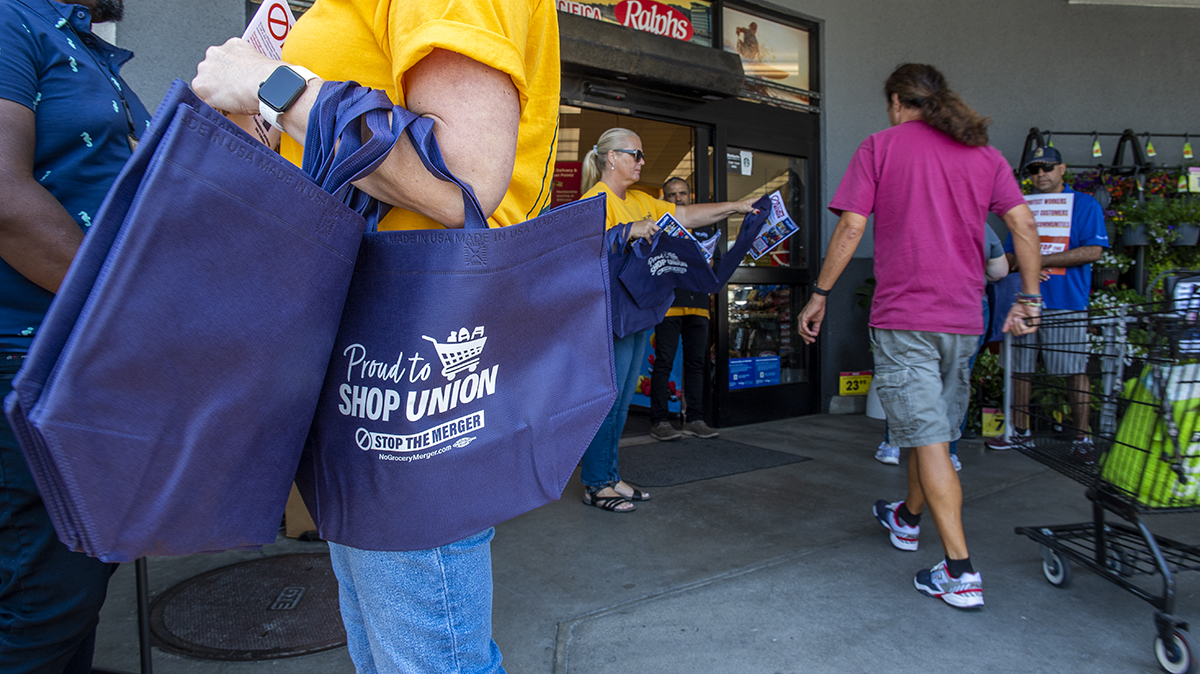Dozens of grocery workers gathered in front of the Ralphs grocery store in Marina Pacifica on Friday afternoon to protest a “mega-merger” of grocery giants Kroger and Albertsons, a move they say would be detrimental to both workers and customers.
Workers and advocates say the merger between the nation’s largest grocers would monopolize the market, result in the closure of many stores and spur an estimated 5,750 layoffs. They also say that it would result in a rise in prices for consumers who are already struggling in the face of inflation.

“This deal is a disaster for customers,” said Yvonne Wheeler, president of the Los Angeles County Federation of Labor. “Kroger wants us to believe that if this merger goes through, that prices will go down. Now, we know that’s not true. When has Kroger ever cared about its customers and its employees and the workers here?”
Since the merger was announced in October 2022, elected officials, grocery workers and their union representatives have been fighting to stop the $24.6 billion deal. In Southern California, Kroger owns Ralphs and Food 4 Less, but if it successfully merged with Albertsons, they would also acquire Vons and Pavilions.
“What they care about is corporate greed,” Wheeler said. “When inflation was at its highest, when we were all forced to spend more money at the grocery store because of the pandemic, did Kroger look out for low income communities? Absolutely not.”

The “Stop the Merger” coalition, which is led by more than 100 organizations, is urging the Federal Trade Commission to block the merging of the two grocery conglomerates.
“We already have a social system that is tattered,” said Judy Wood, who has worked for Albertsons in Orange as a cake decorator for 36 years. “And so with that social system, if you take 5,700 workers that now no longer have health care and you throw them out … that’s a big big threat.”
For Wood, showing up to Friday’s protest was about fighting for job security, especially for younger workers.
“I have a lot of seniority, so I would probably be the last to go, but it’s really not about us. It’s really about our younger generation that are 25 to 30 years old and coming into the workforce, and need to have good, decent jobs for people to actually take care of themselves and their families,” Wood said.
Terri Mondor, a cashier who has worked for the Ralphs company since 1982, said the merger would create a monopoly and eliminate fair competition.
“Communities will lose their stores, be forced to shop elsewhere further away or get food delivery, which they may not be able to afford,” she said. “It’s just not good for anybody.”
Albertsons and Kroger operate more than a dozen stores in Long Beach and Lakewood.
The two largest grocers in the nation have denied claims that they would close any stores or lay off employees if the deal went through. Alternatively, they have said the consolidation of these stores would bring prices down.
In an emailed statement, Kroger said, if the deal goes through, it would invest $500 million to lower prices, $1 billion to raise wages and broaden its selection of fresh products.
“Kroger will not lay off any frontline associates or close any stores, distribution centers or manufacturing facilities as a result of this merger,” a spokesperson said in an email.
“Kroger has asked us to trust them,” Joni Ricks-Oddie, District 9 councilmember, said during a speech in front of the store. “I drive by the Food 4 Less at South and Cherry every day that they closed in retaliation to hero pay. Our City Council passed hero pay to reward workers working through an unprecedented pandemic, putting their lives on the line, and the response from Kroger was to close a store in a community that needed it the most.
“So I’m gonna say that Kroger has not earned that trust over these many years,” she said.
Ricks-Oddie also raised concerns about the food insecurity that already plague’s the city.
“In North Long Beach, we already face a lack of access to affordable quality groceries, diminishing … competition will make a bad situation much worse,” she said. “Because Kroger would no longer need to compete with Albertsons, consumers likely will pay more for groceries. This would translate directly into the quantity and quality of food that families can put on their table.”
Ricks-Oddie, who is a statistician, said she recently agreed to help facilitate a grant that will fund research into the lack of access to healthy food for pregnant women.
“And here we are in a situation limiting communities’ access to quality, healthy foods. That is unacceptable.”
Friday’s protest is one of many that took place ahead of the Fourth of July weekend.
Editor’s note: This story has been updated with a statement from Kroger.

